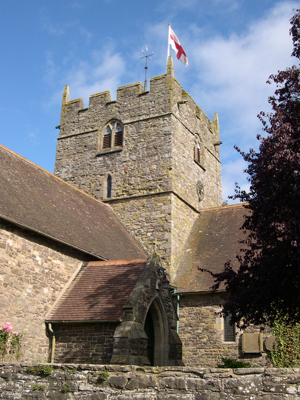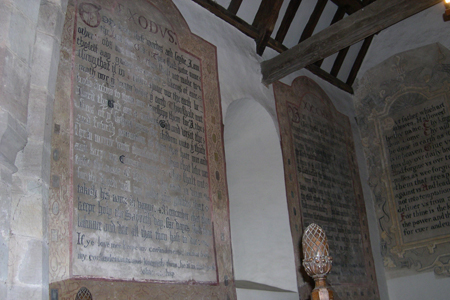| |
 |
 |
 |
| Comment on this report, or find other reports. |
 |
| Our Mystery Worshippers are volunteers who warm church pews for us around the world. If you'd like to become a Mystery Worshipper, start here. |
 |
| Find out how to reproduce this report in your church magazine or website. |
|
|
| 1828: Holy
Trinity, Wistanstow, Shropshire, England |
 |
 |
 |
Mystery Worshipper:
Chris Teean.
The church:
Holy Trinity, Wistanstow, Shropshire, England.
Denomination:
Church of England, Diocese
of Hereford.
The building:
Entering through a lych-gate, one discovers a stone church with
a central square tower surrounded by a grassy graveyard. It
was built on a Saxon foundation between 1180 and 1200, with
later additions and alterations. Unusual for a small village
church, it is cruciform in shape. The nave has many box pews,
some bearing small named brass plaques, taking you back to the
days when whole households had their own specific place. There
are many beautiful stained glass windows. The eye is taken to
the altar, a plain communion table with a brass cross, behind
which is a wooden panel surmounted by a triptych of three lancet
windows depicting Christ crucified. The St Wystan and the St
Anne windows in the nave are very fine examples of the work
of stained glass artists Mary Agnes Rope and Margaret Rope.
There are many stone and brass memorial tablets throughout the
church dedicated to families, benefactors and men who fell in
the two world wars. Early 17th century wall paintings of biblical
texts can be seen in the south transept, and it appears the
writer ran out of space because the writing becomes smaller
at the bottom!
The church:
Parish communion is celebrated every Sunday, and there is a
monthly 1662 holy communion as well as a family service. Holy
Trinity is part of a group of small churches where there is
a rota of other services such as morning or evening prayer held
at various locations in the area. There is a local ministry
development group, and they have a social calendar of events
with a forthcoming soup and pudding lunch and a harvest supper
and ceilidh.
The neighbourhood:
Wistanstow is a small village set in the rolling hills of south
Shropshire, about 10 miles north of Ludlow. The village takes
its name from the Saxon St Wystan, grandson of the king of Mercia,
tragically murdered by a jealous cousin. The Saxon suffix "stow"
means "enclosed place". There is a small primary school
next to the church, a farm opposite, and a string of cottages
and houses, together with a pub that has its own brewery. It
also has a splendid mock Tudor village hall that was given to
the village in 1925 by a local landowner.
The cast:
The Revd Vic Roberts, a retired clergyman, presided at the service.
The date & time:
Sixteenth Sunday after Trinity, 27 September 2009, 11.00am.
What was the name of the
service?
Parish Communion.
How full was the building?
There were 10 people in the congregation, including my companion
and myself! I didn't realise there were so few until we went
for communion; the congregation filled the one communion rail
and that was it. I felt a sense of shock that a church whose
history indicated it had once been bursting at the seams was
now so empty. I couldn't help wondering how they managed financially.
How do they keep the church going, heat it, light it, repair
and maintain it, and pay their parish share to the diocese?
Did anyone welcome you
personally?
We were greeted effusively by several ladies and made to feel most welcome. We had arrived quite early so they were eager to chat with us and tell us about the church.
Was your pew comfortable?
Not particularly. The hassocks were a little thin and the pew
in front was relatively tall, so kneeling was a little like
being in a straitjacket. But then you don't come to church expecting
armchair comfort!
How would you describe the pre-service
atmosphere?
The organ was being played quietly and there was some quiet
chatting going on at the back. It felt quite peaceful.
What were the exact opening words of the
service?
"Good morning, everyone." The Revd Mr Roberts then
drew our attention to the notices on the pew sheet, after which
he continued: "We begin our worship with hymn number 14:
'All my hope in God is founded.'"
What books did the congregation use during the
service?
Common Worship Holy Communion Order 1, Hymns Old
and New, and a pew sheet.
What musical instruments were played?
A traditional pipe organ was played quietly and expertly.

Did anything distract you?
A gentleman behind me had a very loud voice and drowned everyone
else and the organ. Perhaps he thought he was making up for
absentees. He was certainly enjoying himself, singing with great
gusto, and certainly worshipping God – but I do wish he could
have sung in tune! Sitting three rows from the back, I had expected
the church to fill up, with some of the congregation sitting
in front of me so that I could follow their example when receiving
communion. At my own church we no longer receive from the chalice
because of the threat of swine flu! So I was a little bit flustered
when it was time to receive communion to find everyone, all
eight of them, waiting in the aisle for me to go first! However,
I was able to follow a lady who must have sensed my consternation,
and we did indeed receive both bread and wine. It wouldn't have
looked at all good had I been the first at the rail and had
marched back to my pew without receiving the wine!
Was the worship stiff-upper-lip, happy clappy, or
what?
It was reverent and traditional worship but without any smells
or bells. Mr Roberts did not wear a chasuble; rather, he was
vested in choir habit with a green scarf over his surplice and
cassock. I thought it was a shame they didn't use traditional
language – I hope I'm not offending anyone when I say the congregation
was the wrong side of 50, so they would have been brought up
with the traditional words. I always feel slightly irritated
when I have to read the modern version of the creed from the
service book instead of reciting the traditional version, which
I know off by heart. Keep the modern language, if we must have
it, for the family service! There was a slight element of happy-clappy
when we sang the final hymn "Oh Lord, all the world belongs
to you," the refrain of which was: "We'll be turning
the world upside down." I had a sudden vision of Reginald
Dixon rising up on his Wurlitzer organ in the Blackpool tower
ballroom!
Exactly how long was the sermon?
7 minutes.
On a scale of 1-10, how good was the preacher?
7 – Mr Roberts spoke clearly using prepared notes.
In a nutshell, what was the sermon
about?
The disciples were annoyed that someone who was not one of their
group was preaching in the name of Jesus. We should appreciate
and encourage those with no apparent faith who often do great
Christian work, which is not done for any particular reward.
Providing water in the drought stricken areas of the world is
vital, so we give thanks for the relief agencies, Christian
or otherwise, who try to alleviate suffering. We pray for the
kingdom of God to be a society on earth, so it behooves us to
do God's will to qualify for this citizenship. Jesus mentions
salt; salt gives life its flavour. If we want to indicate someone's
worth we say he is the salt of the earth. Salt was once vital
in preserving food. Likewise, Christians are bidden to preserve
all that is pure and wholesome in societies in which there is
often corruption. There are some people who are naturally decent
and kind, but most of us have to work hard at it. There are
no limits to the power of prayer; our prayers are vital.
Which part of the service was like being in
heaven?
I especially enjoyed the prayers of intercession and the singing
of the hymn "Just as I am," which is a particular
favourite of mine.
And which part was like being in... er... the other place?
There was no exchange of peace! Mr Roberts wished us the peace
of the Lord and then carried on with the service. I turned to
embrace and kiss my companion as I usually do, only to be met
with a whispered "They don't do it here."
What happened when you hung around after the service looking lost?
There was no chance of looking lost! Mr Roberts and everyone
else engaged us in friendly chatter. They must have realised
the Mystery Worshipper was either my companion or myself, but
couldn't quite work it out which one of us it was! Anyway, they
acted circumspectly and did not grill us! I would have liked
to talk to the organist, but he managed to slip out whilst we
were in deep conversation with others.
How would you describe the after-service
coffee?
Excellent! The coffee was served from a flask in china mugs
and we could help ourselves to milk and sugar. The empties were
put into a bowl to be taken away and washed at someone's house.
It was well thought out.
How would you feel about making this church your regular (where 10 = ecstatic, 0 = terminal)?
9 – Although my own preference is for a lot more ceremony
with all the smells and bells, it would be out of place here.
I think the service was just about right for the location. If
I lived locally, I would definitely worship here and would want
to be an active part of the team.
Did the service make you feel glad to be a
Christian?
Definitely. That last hymn had us almost skipping out of church.
What one thing will you remember about all this in seven days' time?
As we walked back to the car, I felt very sad at the thought
of all those people who lived there that couldn't be bothered
to get out of bed to support their beautiful little church set
in the midst of them. They just don't know what they are missing.
So to the inhabitants of Wistanstow and all Christians reading
this review: I urge you to visit this lovely church and worship
there. |
|
|
 |
 |
 |
| We rely on voluntary donations to stay online. If you're a regular visitor to Ship of Fools, please consider supporting us. |
 |
 |
 |
| The Mystery Pilgrim |
 |
| One of our most seasoned reporters makes the Camino pilgrimage to Santiago de Compostela in Spain. Read here. |
 |
 |
 |
| London churches |
 |
| Read reports from 70 London churches, visited by a small army of Mystery Worshippers on one single Sunday. Read here. |
| |
|
|
|
|


